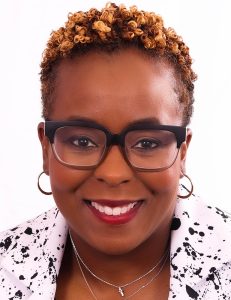I never will forget the day I stood in the middle of the ICU waiting room at the local children’s hospital, embarrassed and a bit enraged. It was my last year of seminary, and I had spent the last four months working as a student chaplain.
Like most days, I arrived at the hospital early, received my assignment from my Clinical Practicum adviser, and was ready to mediate the presence of God to those in need. The assignment for that day was to visit families in the ICU waiting room and offer prayer and/or presence.

Stacy Dandridge
As I began to make my rounds through the waiting room, I stopped by each family to offer comfort in their time of need.
However, I noticed a man who had been observing me from the moment I arrived. His disposition wasn’t friendly, and he sat with a scowl on his face. Since my responsibility was to offer ministry to everyone in the room, avoiding him was not an option. I made my way over to him and I said: “Hello, my name is Stacy. I am a student chaplain and I …”
He immediately interrupted me and said, “Who told you you could do something like this? You are a woman! Who told you God calls women to be ministers?”
As his voice echoed throughout the waiting room, I stood there in shock. Shocked because this would be my first encounter with a person who questioned the validity of my call. But also enraged that he felt the need to do so in a public space. He made it very clear he didn’t want my prayers because I was, in his mind, a woman doing a job only men were qualified for, capable of and called to do.
Products of a system
As I have matured in ministry and have had similar encounters throughout the years, I’ve realized some people, like the man in the ICU waiting room that day, are products of a system: a system that teaches that women are inferior, less than and unqualified. He believed women were incapable of being ministers, but so many men and women in America believe women can’t be in leadership in any setting — spiritual or secular.
“What is it about women in leadership that seems to repulse some Americans?”
What is it about women in leadership that seems to repulse some Americans? Why do some people resist the idea of women in positions of power, despite their proven ability to lead effectively? Systemic sexism and patriarchy are part of the problem. These systems that often demean and marginalize women based on their gender, often undermine their qualifications, making their skills, education and knowledge irrelevant.
Vice President Kamala Harris recently ran for president of the United States of America, launching her campaign in July 2024. She had less than four months to raise money, promote her policies and prepare to win America’s vote, but she lost.
Was it her education? Was it her experience? Was it her policies? No. Unfortunately, I don’t believe any of these played a major role in the outcome. Harris shares in the same struggle so many women in ministry face every day.
As my Pastor, Gina M. Stewart, would say, “She is in the wrong body suit.”
Like Harris, countless women in ministry have been systematically sidelined, not due to their lack of qualifications but solely because of their gender.
What we don’t talk about
We often shy away from discussing the role of gender in determining opportunities within the church, yet gender plays an undeniable role in who ascends to positions of leadership. As a result, many women in ministry have yet to realize their full potential in a religious landscape that is rooted in the same principle as this country: sexism and patriarchy.
Women in ministry often face a myriad of challenges their male counterparts never will have to encounter. They often are overlooked for leadership positions despite their exceptional qualifications. They are paid significantly less than some men in ministry despite having more education or being apt for the role. Furthermore, many church members are skeptical of a woman’s ability to perform her ministerial duties, and she must constantly prove herself.
“Women in ministry often face a myriad of challenges their male counterparts never will have to encounter.”
Such overt misogyny often is rooted in a deep-seated fear of strong, independent women and their potential to disrupt the status quo, as was the case with this year’s election. When President Joe Biden pulled out of the presidential race and Harris emerged as the Democratic candidate, you could sense the panic from the Trump campaign. But a system built to protect and propel Donald Trump did exactly that.
As he began to paint the picture of an incompetent woman who was certainly a “childless cat lady,” he also called on his billionaire buddy Elon Musk to use America PAC to award $1 million per day to registered voters in swing states in return for their signature on a petition and agreeing to be spokespersons for the Trump campaign.
Cutting deals to move ahead is not only reserved for political arenas, but repeatedly it finds its way into the church. It’s not uncommon to hear about the newly elected pastor who may have cut a deal with the electing committee, appointing bishop or the board of elders — a deal that would make him pastor and her not even considered for the role. This is not to suggest every woman who is passed over for the pastorate is qualified for the position; however, this is to raise awareness to the fact that many women, like Harris, have been swindled out of opportunities they were more than qualified for.
Stockholm Syndrome
A back-door deal was not the most disheartening factor in this presidential election for me. Not only was Harris up against sexism, patriarchy, misogyny, back-door deals and covert agendas, she was seeking the support of women who clearly suffer from Stockholm Syndrome and internalized oppression. Women who identified and found common ground with their oppressor and believed the stereotypes that were perpetuated about women.
Remember: 53% of white women voted for Trump. Despite Trump’s well-documented views on minorities and women, an overwhelming number of women found it easier to support a sexist, misogynistic man instead of a woman.
Unfortunately, Stockholm Syndrome and internalized oppression are not limited to the public sector. Every day, women within the community of faith believe the stereotypes about women in leadership and side with a patriarchal, oppressive system. We must acknowledge some women who serve in ministry have been stifled due to the lack of support from other women. Many women don’t believe women have the capacity to lead, let alone serve as pastor of a church.
What now?
So what? Do we allow gender bias and misogyny in the world and in some of our churches to hinder us from fulfilling our calls? Do we resign ourselves to marginalization within our churches and religious organizations and live on the periphery of our calls? Do we succumb to the injuries caused by Stockholm Syndrome and internalized oppression in our churches?
No! We find ways to actively dismantle systemic barriers designed to keep us sidelined. We use our voices, our social media platforms and spheres of influence to combat discriminatory acts and challenge the status quo.
Vice President Harris, in her concession speech, stated it perfectly: “While I concede this election, I do not concede the fight that fueled this campaign. The fight for freedom, for opportunity, for fairness and the dignity of all people.”
She also said: “Sometimes the fight takes a while. That doesn’t mean we won’t win. The important thing is don’t ever give up.”
To those women who are fighting the good fight, I say, keep serving, keep pastoring, keep preaching, and keep fighting. The kingdom needs you!
Stacy D. Dandridge serves as pastor of digital ministry and technology at Christ Missionary Baptist Church in Memphis.


